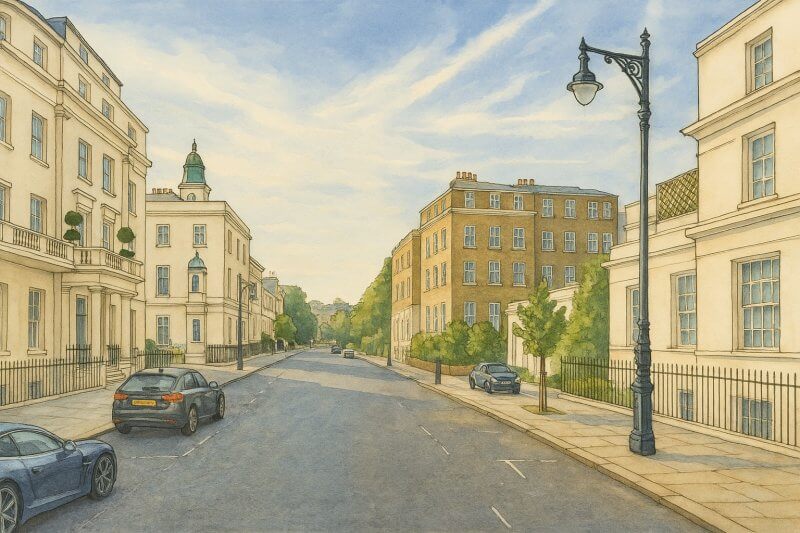
Upper Belgrave Street, London
Elegant, diplomatic, and steeped in prestige - a grand Westminster street with a story to tell
Where is Upper Belgrave Street?
Upper Belgrave Street is located in the heart of Belgravia, a prestigious and elegant district within the City of Westminster in Central London.
The street runs in a roughly north–south direction and is situated between two major garden squares — Belgrave Square to the south and Grosvenor Gardens to the north.
It lies just southwest of Buckingham Palace and a short walk from Victoria Station, making it both secluded and well-connected.
How long is Upper Belgrave Street?
Upper Belgrave Street measures approximately 400 metres (about 0.25 miles) in length.
Although not one of London’s longer streets, it makes up for its relatively modest length with an atmosphere of quiet grandeur, architectural uniformity, and exclusive character.
The history of Upper Belgrave Street
Upper Belgrave Street was developed in the early to mid-19th century during the creation of Belgravia, a neighbourhood masterminded by the Grosvenor family (later the Dukes of Westminster).
The area was laid out primarily by the architect Thomas Cubitt, who began transforming this formerly marshy land in the 1820s into a fashionable residential district for the wealthy elite.
Upper Belgrave Street was mostly built between the 1840s and 1850s, reflecting Cubitt’s neoclassical architectural preferences — tall white stucco-fronted terraced houses with grand porticos, sash windows, and iron railings.
Map of Upper Belgrave Street, London
How Upper Belgrave Street got its name
The street takes its name from the nearby village of Belgrave in Cheshire, which is close to Eaton Hall — the ancestral home of the Grosvenor family.
Many places in Belgravia are named after locations associated with the Grosvenors, including Eaton Square and Chester Street.
Pronunciation: It is commonly pronounced just as it looks: "BEL-grayv" (/ˈbɛl.ɡreɪv/).
Connecting roads and nearby streets
Upper Belgrave Street runs from Belgrave Square in the south to Grosvenor Gardens in the north.
Along the way, it connects with or is intersected by the following roads:
- Chester Street (east side)
- Chesham Place (east side)
- Eaton Square
- Lyall Street (briefly touches it near the northern end)
- Pont Street (west side)
These roads, along with the leafy squares and white-stucco terraces, form the architectural and residential backbone of Belgravia.

Painting of Upper Belgrave Street (View full-size image here)
Major buildings and notable addresses on Upper Belgrave Street
Upper Belgrave Street is lined with elegant, largely uniform Georgian and early Victorian townhouses. Many of these properties are now used as embassies, consulates, or residences for high-ranking diplomats.
Some notable buildings and institutions include:
- 50 Upper Belgrave Street – The Embassy of the Republic of Serbia
- 54 Upper Belgrave Street – The High Commission of the Republic of Malawi
- 51 Upper Belgrave Street – Previously the residence of Sir Henry Campbell-Bannerman, UK Prime Minister (1905–1908)
- Private Members’ Clubs and Ambassadors’ Residences – Various other buildings are used for diplomatic or aristocratic residences.
Most houses are Grade II listed for their architectural and historical significance, and nearly all maintain their original 19th-century appearance.
Nearest London Underground stations
Upper Belgrave Street is conveniently located near several London Underground stations:
- Hyde Park Corner Station – Served by the Piccadilly Line; about a 7-minute walk to the north.
- Victoria Station – Served by the Victoria, District, and Circle Lines; approximately a 10-minute walk northeast.
- Sloane Square Station – Served by the District and Circle Lines; about a 10-minute walk to the south.
These stations make Upper Belgrave Street accessible while allowing it to maintain its quiet, exclusive atmosphere away from the noise of busy high streets.
Fun fact: a diplomatic enclave hidden in plain sight
Despite its tranquil appearance, Upper Belgrave Street is something of a miniature diplomatic quarter.
At any given time, the street is home to several international embassies, high commissions, and ambassadorial residences. This discreet, high-security environment is part of why so many foreign governments choose it as a base in London.
Another interesting detail is that the architecture of the street has remained virtually unchanged since the 19th century. Preservation efforts mean that modern alterations are minimal, and the area gives visitors a clear window into Victorian London’s vision of elegance.
Why visit Upper Belgrave Street?
Though not a typical tourist destination, Upper Belgrave Street appeals to those interested in:
- Architecture – Classic neoclassical and Regency-style terraced housing.
- Diplomatic history – A glimpse at international residences in one of London’s most exclusive areas.
- Peaceful walks – A quiet contrast to the bustle of nearby Victoria and Knightsbridge.
The street is also a favourite for film and television period dramas, thanks to its well-preserved façade and timeless character.
Conclusion
Upper Belgrave Street is a refined and quietly fascinating part of London’s historic Belgravia district. With its diplomatic presence, elegant architecture, and proximity to royal landmarks, it represents the grandeur of a bygone era — yet remains fully functional in modern times.
Whether you're strolling through Belgravia, exploring London’s high society enclaves, or seeking out hidden architectural gems, Upper Belgrave Street is a street worth knowing about — even if only for the stories behind those white stucco walls.